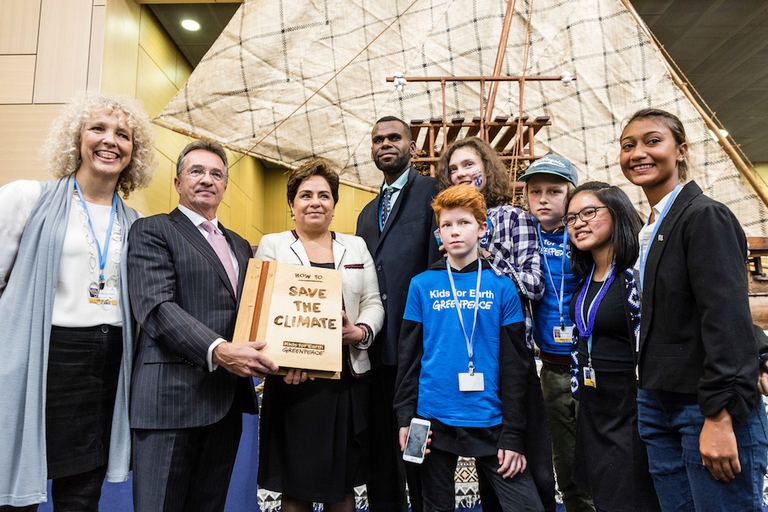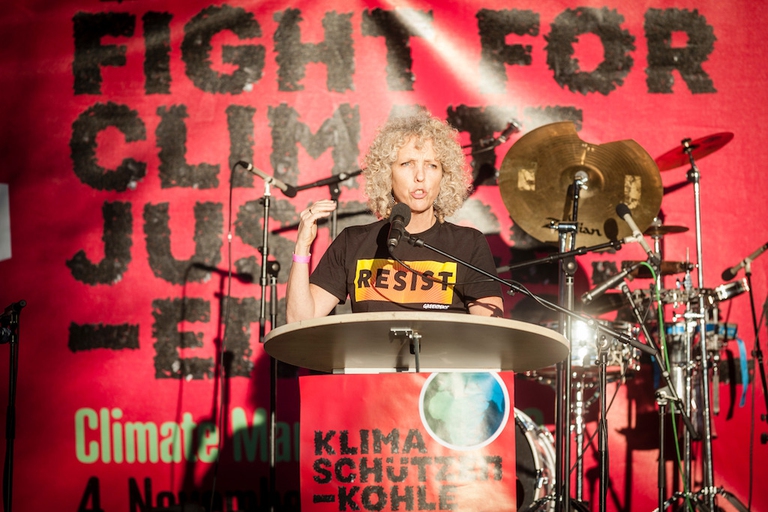
The 26th edition of the United Nations Climate Change Conference, COP26, will be held in Glasgow, Scotland in November 2020. The pre-COP will take place in Milan, Italy.
What role governments, NGOs, people and gender play in climate change action. We spoke to Jennifer Morgan, Executive Director of Greenpeace International, about what the COP23 being held in Bonn is all about.
Greenpeace, like hundreds of other NGOs from around the world, is present at the COP23 being held in Bonn, Germany until the 17th of November. We spoke to Jennifer Morgan, Executive Director of Greenpeace International, organisation committed to environmental protection since 1971, about the demands it has set forward for the negotiators of the 197 countries who have ratified the United Nations Framework Convention on Climate Change (UNFCCC). That is, those who are deciding how the world should mobilise to fulfil the targets set by the Paris Agreement adopted at the COP21 in 2015 in terms of greenhouse gas emissions reduction and limiting the rise in global temperatures to “well below 2 degrees Celsius” by the end of the century, compared to pre-industrial levels.
“This COP is about having the Paris Agreement implemented, so we need to get a good basis for rules moving forward, for transparency as well as a good platform for raising ambition in the future,” Morgan commented. She also expressed the view that this conference is a platform in which to show that the decision of the United States under the presidency of Donald Trump to withdraw from the Paris Agreement has isolated the country internationally and strengthened instead of weakened the world’s resolve to continue in its efforts to combat climate change.
In the lead-up to the COP, Morgan declared her disappointment with world leaders who “have failed to deliver on their promise” of limiting the rise in global temperature to 1.5 degrees Celsius as established by the Paris Agreement, which entered into force in November 2016. “We have no time to waste. Our climate is changing, putting people and communities increasingly at threat,” Morgan writes in a Greenpeace blog post. “We have a window of opportunity to take fast, bold action to deliver true security and justice for every one of us”.
Commenting on Trump’s decision to turn the clock back on the decisions agreed upon at the COP21, she adds: “There is no turning back and there will be no renegotiation and that message must be made clear at COP23. We expect new leaders to emerge in Bonn and the eyes of the world will be on the EU, China and others to step up”.
One of the COP’s functions is to act as a meeting point for multiple actors to come together and dialogue: from national delegations, international institutions and the private sector, to civil society representatives such as non-governmental organisations like Greenpeace. “NGOs play a myriad of different roles: we do everything from bringing public pressure to putting forward specific, well-researched ideas for the negotiations, and educating the public about what’s going on inside and trying to explain what it is,” Morgan outlines.
As an example of the importance of civil society coming together to put pressure on governments to act against climate change, she cites the march that took place in the streets of Bonn ahead of the COP on the 4th of November, in which organisers say 25,000 people took part, which called on a global phasing out of coal. The action was directed especially at Germany, the COP’s host country: even though, on the one hand, it leads the European Union in climate change mitigation efforts, on the other, it still relies on coal for 40 per cent of its electricity generation and hasn’t yet declared its intention to abandon this fossil fuel.
Morgan specified that summits such as the COP are a “great platform for countries to come out and commit to phasing out coal”. True to her words, on the 16th of November around 20 countries including Canada, the United Kingdom, Italy, Denmark and Mexico declared their intention to phase coal out by 2030 as signatories to the Powering Past Coal Alliance.
The world’s dirtiest fossil fuel has no future.
20 countries are phasing out coal by 2030: https://t.co/P6xUzk4DgI #EndCoal
— Greenpeace (@Greenpeace) 16 novembre 2017
Morgan also spoke of the crucial role individuals play in supporting NGOs and putting pressure on governments to act. “What I see are more and more people being active. You see individuals being more involved and that empowers NGOs, and should empower governments to do the right thing,” she commented.
In particular, she hailed the efforts of Norwegian youth, supported by Greenpeace’s Save the Arctic campaign, who have taken their government to court over its granting of new oil drilling licenses in the Arctic ocean, “because it’s not implementing the constitution, protecting the rights of future generations”. Just like Germany’s stubbornness at giving up coal, this stands in contrast with Norway being the first developed nation to have ratified the Paris Agreement.
“Negotiating for global climate action in Bonn while planning to open up the Arctic for oil drilling is simply incompatible and when politicians put oil before people, they need to be held accountable.”
(Jennifer Morgan)
International action against global warming has increasingly been enriched by an attention towards how this phenomenon is affected by as well as impacts gender. Six years ago Gender Day, held at the COP 23 on the 14th of November, was incorporated in the UNFCCC and the Gender action plan was presented in Bonn to operationalise the integration of the gender agenda in climate action programmes.
Morgan summed up the relationship between gender in the context of climate change action by saying: “Gender plays a role because women are often some of the most vulnerable. It plays a role because women are the ones having to deal with the impacts. They’re also a major part of the solution, because we need more cooperation and collaboration”. For all these reasons “we need more women leaders”. Such as her? Such as “every woman, from little girls all the way to grannies”. Because being a leader means being open to dialogue but also “having the courage to say enough is enough”. And if politicians don’t do it, then the burden falls on Jennifer Morgan, the Bonn protesters and people like us.
Siamo anche su WhatsApp. Segui il canale ufficiale LifeGate per restare aggiornata, aggiornato sulle ultime notizie e sulle nostre attività.
![]()
Quest'opera è distribuita con Licenza Creative Commons Attribuzione - Non commerciale - Non opere derivate 4.0 Internazionale.
The 26th edition of the United Nations Climate Change Conference, COP26, will be held in Glasgow, Scotland in November 2020. The pre-COP will take place in Milan, Italy.
Thanks to activists, the voice of the world’s peoples resounded through the COP25 like an alarm bell. Governments didn’t reach the results they demanded, but their cries and messages were stronger than ever, reaching even those who weren’t in Madrid.
Climate change poses a risk for millions. However, women are the most vulnerable to its negative consequences: a few simple considerations by the Italian Climate Network help us perceive the global implications of this.
The COP25 ended two days late and with very few steps ahead made. Climate negotiations in 2020 will be an uphill battle as political will clearly seems to be lacking, once again.
The last ten years have been the most “exceptional” and hottest decade ever, with extreme weather hitting people and ecosystems harder and more frequently. 2019 is also on course to becoming the second or third hottest year since records began.
Unite Behind the Science: this was the title of the conference held at the COP25 on 10 December. Greta Thunberg’s presence filled the arena, but this time it was scientists’ turn to speak.
25,000 delegates meet for the COP25 from 2 to 13 December. What can we hope this UN climate change conference, whose venue was changed from Santiago de Chile to Madrid, will achieve?
100 eminent people from all over the world, including Vandana Shiva, Naomi Klein and Noam Chomsky, have signed an open letter after the disappointing results of the COP24. A call-to-arms for climate against world leaders’ indifference.
The outcome of the COP24 in Katowice left many unsatisfied. Greta Thunberg, a young Swedish environmental activist, gave a harsh, heartfelt speech addressing world leaders.









